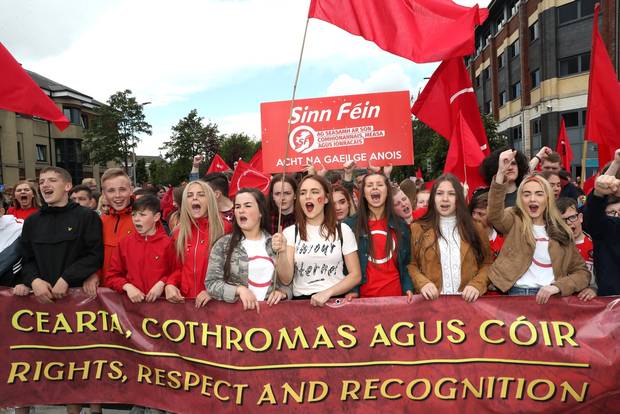JAKE MAC SIACAIS
Director of Forbairt Feirste.
‘Cultural Supremacy’is a term that has been bandied about with increasing frequency by the major Pro-Union party in the British Controlled North Eastern Counties of Ireland. The Democratic Unionist Party, which enjoyed a slender majority in the local institutions at Stormont, set up under the Good Friday Agreement, was finally forced from office in January 2016 when the then Deputy First Minister, the late Martin McGuinness of Sinn Féin, resigned from office.
McGuinness cited the failure of Unionists to implement agreed rights promised under both the Good Friday Agreement of 1998. He said: “The equality, mutual respect and all-Ireland approaches enshrined in the Good Friday Agreement have never been fully embraced by the DUP. For those who wish to live their lives through the medium of Irish elements in the DUP have exhibited the most crude and crass bigotry”.
We’re finally at the nub of the problem. A time of great opportunity or missed opportunity. A stalemate will put increasing pressure on the Irish and British Governments, to devise a strategy for delivering on the promises of the 1998 agreement.
Our endless series of talks which have lasted almost a year are in limbo. Sinn Féin’s Northern Leader Michelle ó Neill announced on Mon Nov 13th that the talks “are over.” and that “The reason for the lack of agreement is DUP opposition to a rights based society.”
From the perspective of the DUP’s Arlene Foster talks are deadlocked because: “what we can’t see is one section of the community having cultural supremacy over others”.
On the occasion of Foster’s elevation to the leadership of the DUP my organistion, the West Belfast based Irish Language development agency Forbairt Feirste wrote to her (10/12/2015) in the following terms:
“We believe in taking opportunities for building goodwill and mutual understanding and would therefore like to invite you to organise a party delegation to visit the Gaeltacht Quarter at the invitation of Forbairt Feirste.”
We recieved not as much as an acknowledgement of receipt of that letter.
We have written in similar terms to the DUP on several occassions. The latest of those was in April 2017. We again invited her to meet with us and expressed the hope that we would hear from her soon.
We still await a reply.
Fair enough. The invitation stands.
Perhaps it’s time for us all to step back and try to see this stalemate as opportunity rather threat. There is clearly unfinished business.
I’d like to offer my perspective.
There is nothing more important to us all, than identity. The cultural expression of the identity which we derive (or indeed construct) from exploring identity is personal, precious and quite often complex. It is always a journey.
The majority of us will take huge umbrage with anyone who disparages our culture. In situations of conflict and of competing cultures this can often turn nasty, violent or just be hugely disruptive.
Let’s now consider why thousands took to the streets of Belfast throughout 2017 to demand an Irish Language Act. Leave aside party politics and consider the question seriously.
I’m a Gaelic speaker. I work in the Irish Language sector. I’m an Irish Republican and a socialist.
There are still those who have problems with my Irish identity. I have repeatdely been appalled with insults that I have had to endure and which all Irish speakers have had to endure. All who marched in Belfast demanding an Irish Language Act feel the need for legislative protection of our rights. We don’t trust Pro-British Unionist politicians to respect our rights.
Those who have a problem with Irishness, are in two broad categories, firstly those who hold and have held antagonistic views about Gaelic Language and culture since the foundation of the northern state in 1922 and those who currently vote for parties which espouse a Pro-British Unionist position in greater or lesser measure.
Secondly there are those who hold these antagonistic views and seek to be in government and who furthermore wish to equate and link my Language with the cultural allegiances of others which I do not in any way share but which I do not seek to deny to them. It’s not on. It won’t happen.
Both the current DUP and Sinn Féin mandates are impressive. Only 52,000 votes separate them.
The artificial state in which we live, was and is ultimately a product of British policy towards Ireland since the early 20th century. The state is approaching 100 years of age and all of us, clearly agree that this is not a stable, harmonious or truly peaceful place to live in.
For most nationalists Cultural Supremacy means only one thing: Orange and unionist domination and naked sectarianism. Nationalists genuinely feel and have felt like second class citizens in our own place. We are surrounded on every side by the symbols of Britishness and the ‘unique displays of Britishness’ which dominate the public space.
Language protection is a Europe wide practice. Our neighbours in Scotland and Wales have legal protections. How much more do we need them here given our circumstances?.
Let’s hope the stalemate and changed realities of demographics produce real dialogue whenever it may come. Things have changed utterly. Genuine new thinking is needed if we are to arrive at workable arrangements. Half deals and cobbled together deals just won’t cut it. Let’s travel in hope.
Forbairt Feirste is a Belfast-based Irish Language development agency which strives to unleash the economic power of Belfast’s Irish speaking community to the benefit of the entire city.

